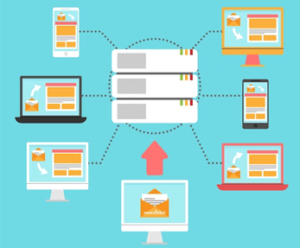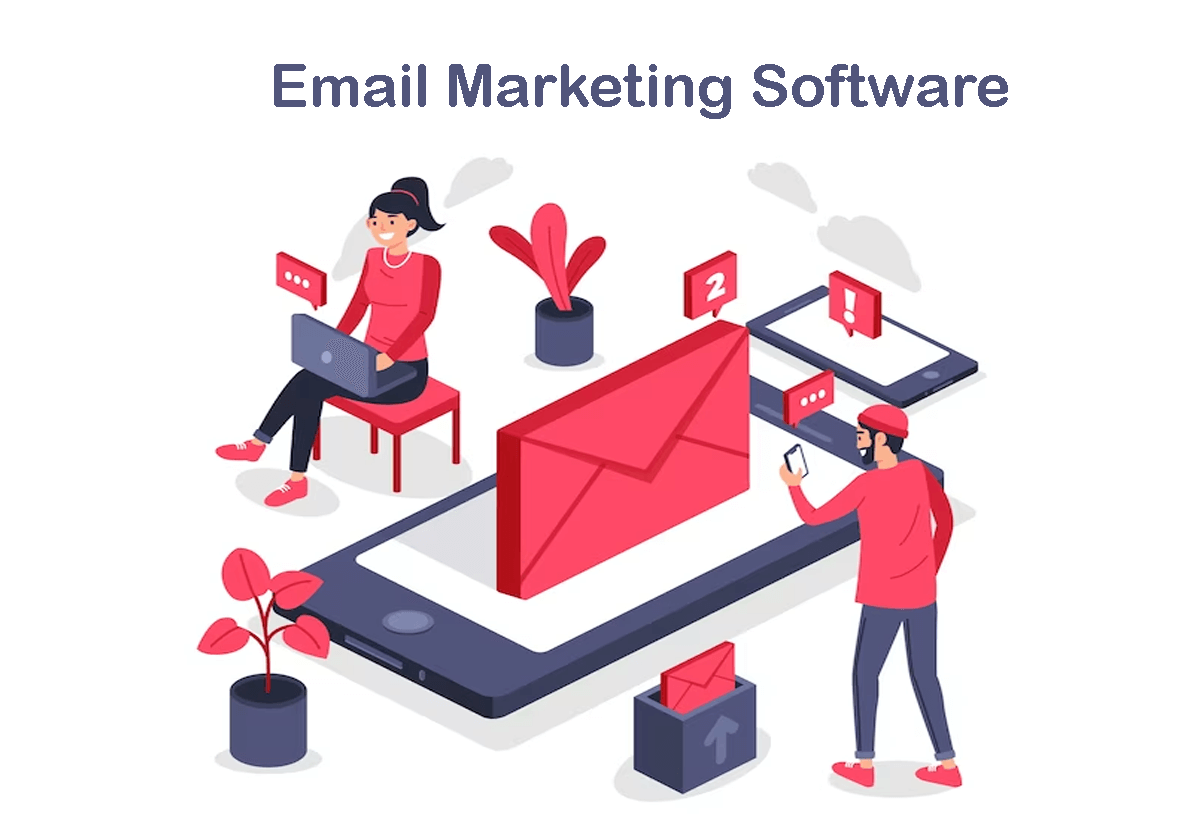What's Inside?
Email marketing software is a digital tool that allows businesses and individuals to create, send, and track email campaigns to a list of subscribers. It is designed to help users automate email marketing processes, build targeted email lists, create visually appealing email templates, and track campaign performance through metrics such as open rates, click-through rates, and conversion rates. Email marketing software typically includes features such as segmentation, personalization, automation, A/B testing, and analytics to help users optimize their email campaigns for maximum effectiveness and ROI.
Why use Email Marketing Software?
Email marketing software is a tool that can help businesses of any size create engaging email marketing campaigns, loyalty emails, and other digital messages. These platforms enable a personal touch while maintaining a clear message and scalability for larger audiences. With targeted mailing lists, email marketing tools help reach the desired audience at the right time. Promotional emails and loyalty emails are the two primary areas of email marketing. Promotional emails include newsletters and ads, while loyalty emails are communications triggered by consumer actions or used to nurture an existing relationship, such as personalized newsletters.
Email marketing software helps compile potential leads, control and segment audiences, and gather tracking information for campaign analysis. Coupled with marketing automation tools, email marketing can be an integral part of any marketing strategy, providing a concise message across all marketing channels.
Emails sent with email marketing tools serve various purposes, such as improving relationships with current or past customers to encourage loyalty and attract repeat business. They can also acquire new customers or encourage current customers to take immediate action. Automation features in most email marketing tools help schedule and distribute personalized emails efficiently. Segmented and organized email lists enable accurate tracking of data points such as open rates and subscribers. Overall, email marketing software provides useful tools to integrate into a marketing strategy.
Email marketing software can solve a variety of business problems, such as establishing a brand identity, improving customer communication, and customer segmentation. Establishing a consistent brand identity is crucial to any marketing strategy. Email marketing software provides customizable templates to create continuity between a business’s website and marketing materials, improving engagement and retention. Personalized content in a newsletter or curated loyalty campaign builds audience trust, engages an established audience, and shares new features with subscribers. Customer segmentation simplifies the email sending process by sending relevant content to each group, leading to better open and click rates. Automation allows businesses to send thousands of emails at once, streamlining the manual process of sorting recipients, entering a subject line, and sending the email.
Who Uses Email Marketing Software?
 Email marketing is a crucial campaign strategy for both sales and marketing teams. The following teams most commonly use email marketing software:
Email marketing is a crucial campaign strategy for both sales and marketing teams. The following teams most commonly use email marketing software:
- Marketing teams – Marketing teams work together to plan and execute successful email campaigns. Using email marketing software, designers, writers, developers, and managers collaborate to create compelling campaigns. By centralizing the workflow, email marketing platforms streamline the process of curating a specific email marketing campaign.
- Sales teams – Sales teams are responsible for generating campaign ideas and working with marketing teams to bring them to life. Email marketing is an effective tool for making sales and is a practical outlet for sales teams of all types.
What can I expect from free email marketing software?
Free email marketing software typically provides basic features for creating and sending emails to a limited number of contacts. Some common features that you can expect from free email marketing software include:
- Email templates: Most free email marketing software provides a selection of pre-designed email templates that you can use to create professional-looking emails.
- Contact management: You can manage your contact list, including adding, removing, and segmenting contacts.
- Email scheduling: You can schedule your email campaigns to be sent at a specific date and time.
- Reporting and analytics: You can track the success of your email campaigns by monitoring open rates, click-through rates, and other key metrics.
- Integration with other tools: Some free email marketing software may integrate with other marketing tools such as social media platforms or CRM systems.
It’s important to note that free email marketing software typically has limitations, such as a limited number of contacts and emails per month, limited automation features, and limited support. If you need more advanced features or have a larger contact list, you may need to upgrade to a paid plan.
Best Email Marketing Software of 2023
There are many email marketing software options available, each with its own strengths and features. Here are some popular options that are widely regarded as some of the best email marketing software:
- Mailchimp – This is a popular option for small businesses due to its user-friendly interface, automation features, and free plan for up to 2,000 subscribers.
- Drip – This is an email marketing software designed for eCommerce businesses, online marketers, and digital marketing agencies. It offers features such as email marketing automation, personalized emails, segmentation, and integrations with popular eCommerce platforms and tools.
One of Drip’s key features is its visual workflow builder, which allows users to create automated email campaigns that trigger based on specific user behaviors or events. For example, a user who abandons their shopping cart on an eCommerce website might trigger an automated email campaign reminding them of their abandoned items.
- HubSpot – This software offers an all-in-one marketing solution, including email marketing, CRM, and social media management. It offers advanced personalization options and integrations with other marketing tools.
- ActiveCampaign – This email marketing tool is known for its advanced automation features, including dynamic segmentation and conditional content. It also includes CRM functionality and integrations with popular e-commerce platforms.
- MailerLite – This is a cloud-based email marketing software that allows users to create and send personalized email campaigns, newsletters, and automated workflows. Some of its key features include a drag-and-drop email editor, landing page builder, pop-up forms, and A/B testing. MailerLite also provides detailed analytics to track email campaign performance and subscriber behavior. The software is known for its user-friendly interface and affordable pricing plans, making it a popular choice for small to medium-sized businesses. Additionally, MailerLite offers integrations with various third-party platforms such as Shopify, WordPress, and Zapier.
The best email marketing software for your business will depend on your specific needs and budget. It’s important to evaluate different options and compare features to determine which one is the best fit for you.
Email Marketing Software Features
 Email marketing software typically offers a range of features that can help businesses create and manage effective email campaigns. Some common features include:
Email marketing software typically offers a range of features that can help businesses create and manage effective email campaigns. Some common features include:
- Email templates: Pre-designed email templates can make it easy to create professional-looking emails with a consistent style.
- Email scheduling: The ability to schedule emails in advance allows businesses to reach their audience at the most effective time.
- Subscriber management: This feature allows businesses to manage and organize their email lists, segmenting subscribers based on various criteria to better target their campaigns.
- Automated email campaigns: Automated emails can be triggered by certain actions or behaviors, such as a new subscriber or a completed purchase, allowing businesses to send targeted messages at the right time.
- A/B testing: This feature allows businesses to test different variations of an email campaign to determine which version performs better.
- Analytics and reporting: Email marketing software can provide businesses with detailed analytics on email open rates, click-through rates, and other key metrics, allowing for the optimization of future campaigns.
- Integration with other marketing tools: Many email marketing platforms can integrate with other marketing tools, such as CRM software or social media platforms, to streamline marketing efforts across channels.
- Personalization: Personalizing emails with subscribers’ names, interests, and other relevant information can increase engagement and lead to better results.
- Spam compliance: Email marketing software should comply with spam regulations and include tools to manage unsubscribe requests and avoid being marked as spam by email providers.
- Mobile optimization: With a majority of emails now opened on mobile devices, email marketing software should include mobile optimization features to ensure emails look and function properly on small screens.
Kinds of Email Marketing Software
Email marketing software is often used for two primary purposes: promotional and loyalty campaigns.
Promotional campaigns are the most common use of email marketing software and are typically targeted at potential customers or top-of-funnel recipients. The goal is to generate leads and increase sales by showcasing products or services, announcing promotions or discounts, or providing valuable information.
Loyalty campaigns, on the other hand, are focused on nurturing existing customer relationships and driving repeat business. These emails are more personalized and tailored to individual customers, often taking the form of newsletters, reminders, and transactional notifications. The goal of loyalty campaigns is to strengthen brand loyalty and increase customer lifetime value.
Potential Issues with Email Marketing Software
While email marketing software can be a powerful tool for businesses, there are also some potential issues that should be considered:
- Spam filters: Email marketing software sends a large volume of emails, and it’s possible that some of them may be filtered out as spam by email providers. This can result in lower deliverability rates and may prevent some of your recipients from ever seeing your messages.
- Deliverability issues: Even if your emails make it past spam filters, there may still be deliverability issues if your email list contains invalid or inactive email addresses. This can hurt your sender reputation and lead to even more emails being filtered out as spam.
- Opt-out rates: Some recipients may opt out of receiving your emails, which can lead to a smaller email list and decreased engagement rates. It’s important to monitor opt-out rates and adjust your email strategy if necessary to prevent losing too many subscribers.
- Data privacy and security: Email marketing software often involves collecting and storing personal information about your subscribers. It’s important to ensure that your software provider has strong data privacy and security measures in place to protect this information from unauthorized access or misuse.
- Cost: While there are free and low-cost options available, some email marketing software can be expensive, especially as your email list grows. It’s important to consider the cost-benefit ratio and whether the investment in email marketing software is worth it for your business.
Trends Related to Email Marketing Software
Some trends related to email marketing software include:
- Increased use of automation: Automation is becoming more prevalent in email marketing software, with the ability to automate tasks such as list segmentation, email scheduling, and follow-up emails. This allows marketers to be more efficient and effective in their campaigns.
- Focus on personalization: Personalization has become a major trend in email marketing, with marketers using customer data to create more tailored and relevant content for their audience. This can include personalized subject lines, product recommendations, and more.
- Integration with other marketing tools: Email marketing software is increasingly being integrated with other marketing tools such as CRM software, social media platforms, and analytics tools. This allows marketers to better track and analyze the effectiveness of their campaigns across multiple channels.
- Use of machine learning and AI: Machine learning and AI are being used more frequently in email marketing software to help optimize campaigns and improve engagement rates. This includes using algorithms to identify optimal send times, personalization based on customer data, and more.
- Mobile optimization: With the increasing use of mobile devices for email consumption, email marketing software is focusing more on mobile optimization. This includes designing emails that are mobile-responsive and optimizing for mobile-specific behaviors such as scrolling and tapping.
Best Email Marketing tools
 There are many great email marketing tools available, and the best one for you will depend on your specific needs and budget. Here are some popular options to consider:
There are many great email marketing tools available, and the best one for you will depend on your specific needs and budget. Here are some popular options to consider:
- Mailchimp: Mailchimp is a popular email marketing platform that allows users to create and send email campaigns, build landing pages, and track performance. It also offers marketing automation and integration with other marketing tools.
- Constant Contact: Constant Contact is an email marketing platform that offers a variety of tools for creating and sending email campaigns, building landing pages, and managing contacts. It also offers social media marketing and e-commerce tools.
- HubSpot: HubSpot is an all-in-one marketing, sales, and customer service platform. Its email marketing tools allow users to create and send email campaigns, track performance, and integrate with other marketing tools.
- ConvertKit: ConvertKit is an email marketing platform designed for bloggers and content creators. It offers email automation, segmentation, and a variety of integrations with other marketing tools.
- AWeber: AWeber is an email marketing platform that offers a variety of tools for creating and sending email campaigns, building landing pages, and managing contacts. It also offers marketing automation and integration with other marketing tools.
- GetResponse: GetResponse is an email marketing platform that offers a variety of tools for creating and sending email campaigns, building landing pages, and managing contacts. It also offers marketing automation, webinar hosting, and e-commerce tools.
- ActiveCampaign: ActiveCampaign is a marketing automation platform that includes email marketing tools. It offers advanced segmentation, personalization, and automation features, as well as integration with other marketing tools.
- Campaign Monitor: Campaign Monitor is an email marketing platform that offers a variety of tools for creating and sending email campaigns, building landing pages, and managing contacts. It also offers marketing automation and integration with other marketing tools.
- Drip: Drip is an email marketing platform designed for e-commerce businesses. It offers email automation, segmentation, and personalization features, as well as integration with e-commerce platforms and other marketing tools.
- Sendinblue: Sendinblue is an all-in-one marketing platform that includes email marketing tools. It offers a variety of features, including email automation, segmentation, and personalization, as well as SMS marketing and chat functionality.
Each of these email marketing tools has unique features and pricing plans, so it’s important to compare them and choose the one that meets your specific needs.
Free Email Marketing Tools
There are several free email marketing tools available, here are some examples:
- Mailchimp: Mailchimp offers a free plan that allows you to send up to 10,000 emails per month to up to 2,000 subscribers. This plan includes basic email marketing features such as email templates, list segmentation, and basic automation.
- Sendinblue: Sendinblue offers a free plan that allows you to send up to 300 emails per day, with no limit on the number of contacts you can have. This plan includes features such as email templates, marketing automation, and contact segmentation.
- Benchmark Email: Benchmark Email offers a free plan that allows you to send up to 250 emails per month, with no limit on the number of contacts you can have. This plan includes features such as email templates, list management, and basic automation.
- Sender: Sender offers a free plan that allows you to send up to 15,000 emails per month to up to 2,500 subscribers. This plan includes features such as email templates, automation, and contact segmentation.
- Moosend: Moosend offers a free plan that allows you to send unlimited emails to up to 1,000 subscribers. This plan includes features such as email templates, list management, and basic automation.
It’s important to note that while these email marketing tools offer free plans, they may have limitations in terms of features or the number of emails or contacts you can have. It’s also important to consider the specific needs of your email marketing campaigns and choose a tool that best suits those needs.
What to Look for in a Good Email Marketing Tool?
When looking for a good email marketing tool, there are several factors to consider:
- Ease of Use: Look for a tool that is user-friendly and easy to navigate, especially if you don’t have a lot of technical expertise.
- List Management: Your email marketing tool should allow you to easily manage your email lists, segment your subscribers, and track their behavior.
- Email Templates: Choose a tool that offers a variety of customizable email templates, so you can create professional-looking emails that align with your brand.
- Automation: Look for a tool that offers automation features like triggered emails, drip campaigns, and autoresponders. This will save you time and help you reach your subscribers at the right time.
- Reporting and Analytics: The tool should offer detailed reporting and analytics so you can track the success of your campaigns and make data-driven decisions.
- Integrations: Consider whether the email marketing tool integrates with other tools you use, such as CRM software or e-commerce platforms.
- Deliverability: Look for a tool that has a good reputation for delivering emails to inboxes and avoiding spam filters.
Why Email Is About More Than Marketing
Email is not just a tool for marketing, but a versatile communication platform that can be used for a variety of purposes. Here are a few reasons why email is more than just a marketing tool:
- Internal communication: Email is commonly used as a means of internal communication within a company or organization. Employees can use email to send messages, share files, and collaborate with one another.
- Customer support: Email is an important channel for providing customer support. Many companies use email to handle customer inquiries, complaints, and feedback. This allows customers to communicate with a company at their convenience and provides a record of the interaction for future reference.
- Sales: While email is often used for marketing purposes, it can also be a powerful sales tool. Sales teams can use email to communicate with prospects and clients, share information about products or services, and follow up on leads.
- Networking: Email can be used to build and maintain professional relationships. People can use email to connect with others in their industry, share information, and collaborate on projects.
Email is a versatile and effective communication tool that can be used for a variety of purposes beyond just marketing.
Email Marketing Software FAQs
- Mailchimp: It offers a free plan for up to 2,000 subscribers and 10,000 emails per month, with basic email templates and automation features.
- Sendinblue: It offers a free plan for up to 300 emails per day, with basic email templates, automation features, and a landing page builder.
- HubSpot: It offers a free CRM with basic email marketing features, including email templates, personalization, and tracking.
- Moosend: It offers a forever-free plan for up to 1,000 subscribers, with basic email templates, automation features, and reporting.
- Benchmark: It offers a free plan for up to 2,000 subscribers and 14,000 emails per month, with basic email templates and automation features.
- Klaviyo: Klaviyo is a popular email marketing tool specifically designed for eCommerce businesses. It offers features such as segmentation, automated workflows, and personalized product recommendations.
- Omnisend: Omnisend is another email marketing tool built for eCommerce. It includes features such as automation workflows, segmentation, and cart abandonment emails, as well as integration with popular eCommerce platforms such as Shopify, Magento, and WooCommerce.
- Mailchimp: While Mailchimp is not exclusively built for eCommerce, it does offer features that are useful for online businesses, such as abandoned cart emails, product retargeting ads, and order notifications.
- Constant Contact: Constant Contact is another email marketing tool that is not specific to eCommerce, but it does offer features such as automation workflows and contact segmentation that can be useful for online businesses.
- Building an email list: The first step is to gather a list of subscribers who have opted in to receive emails from your business. This can be done through sign-up forms on your website or landing pages, as well as through other marketing channels.
- Creating an email campaign: Once you have a list of subscribers, you can create an email campaign using templates or by customizing your own design. This involves adding content, images, links, and calls-to-action that are relevant to your subscribers and the goals of your campaign.
- Segmenting your email list: To improve the effectiveness of your campaigns, it's important to segment your email list based on factors like demographics, interests, and behavior. This allows you to tailor your content and messaging to specific groups of subscribers.
- Setting up automation: Email marketing software allows you to set up automated email sequences that are triggered by specific actions or events, such as a subscriber signing up for your newsletter or making a purchase on your website.
- Sending your email: Once your email campaign is ready, you can use the email marketing software to schedule the delivery of your emails at a specific time and date. Some software may also offer features like A/B testing, which allows you to test different versions of your email to see which performs better.
- Analyzing your results: After your emails have been sent, you can use email marketing software to track metrics like open rates, click-through rates, and conversions. This allows you to measure the effectiveness of your campaigns and make improvements for future campaigns.
- Control: On-premise email marketing software gives you more control over your data and allows you to manage your email campaigns independently. If you have strict data privacy and security policies, you may prefer an on-premise solution.
- Cost: On-premise software requires a larger upfront investment as you will need to purchase and maintain the necessary hardware and software. You may also need to hire IT staff to manage and maintain the system, adding to the ongoing cost.
- Scalability: On-premise software can be more difficult to scale as your business grows. Adding new users or upgrading hardware can be time-consuming and expensive.
- Maintenance: On-premise software requires regular maintenance and updates to ensure it is running smoothly and securely. If you don't have the necessary IT resources, this can become a significant burden.


